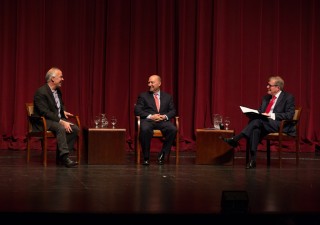Title
Subhead

New York Times columnist David Brooks and Fletcher School Dean James Stavridis joined Juilliard President Joseph Polisi for a forum on the arts and leadership.
(Photo by Rosalie O'Connor)How can we develop knowledgeable and empathetic leaders and world citizens? Do the arts really matter in a world of war and terrorism and refugees? Can artistic engagement really develop strong leaders and citizens?
Body
These were some of the provocative questions President Joseph W. Polisi asked in a public forum at Juilliard on March 29. He moderated a panel discussion with James G. Stavridis, the retired admiral, former supreme allied commander of NATO, and current dean of Tufts University’s Fletcher School of Law and Diplomacy; and New York Times columnist David Brooks. The talk was bookended by two performances with political/social messages by Juilliard alums: Sekou Laidlow gave a monologue from Athol Fugard’s My Children! My Africa! and tenor Paul Appleby sang “Here I stand” from Stravinsky’s The Rake’s Progress.
The two panelists agreed on many things, particularly the qualities necessary for leadership. Brooks’s list consisted of humility and radical self-awareness, the ability to constantly compensate for one’s own weaknesses as a leader, the capacity to make and stick to deep commitments, and a capacity for appreciating beauty and with it ideas and justice. To those Stavridis added he would also like to see leaders with a sense of balance, humility, the ability to form a team, and a sense of humor.
Brooks and Stavridis differed a bit on why the arts are useful. Brooks felt that “arguing for the humanities because they will make more employable college graduates and a better society is off-base because “that’s not why we come to the theater or listen to music. It’s not for public good. It’s for something more important, which is the formation of the inner spirit—and we do it because it’s fun,” he said. “If we think of the arts as broccoli for social improvement, you’ve taken away the fun, and if you take away the fun, you’ve taken away the core.”
Stavridis qualified that notion by calling instead for “roasted broccoli with lemon and olive oil.” He explained, “the arts do make you a better person and a more complete citizen, in part because of the discipline, in part the empathy and connectivity” that they engender. “Where we get into trouble in our personal and national lives is when we build walls. The arts are a bridge that can help connect us,” he added. Stavridis also took up a concept he’d described at a Juilliard forum last year in which he advocated for the need for “soft power,” noting that the “the 20th century was almost a complete failure in terms of security” with its calamitous world wars, and the fact that “we almost blew up the planet in the Cuban missile crisis.” Those failures were the result of walls—the Maginot Line, the Iron and Bamboo Curtains, the Berlin Wall, he noted, but “walls will not create security in the 21st century. We have to build bridges.”
During the question period, second-year master’s pianist Jun Luke Foster asked “how as artists can we build bridges rather than barriers” while noting that there is a “widespread view that classical music is elitist.” Polisi was the first to address the question. He noted that more than 90 percent of Juilliard students qualify for some sort of financial aid and pointed out that one reason Juilliard has been focusing on “asking artists to function beyond the stage and take responsibility after performances” is to be able to both “have a sense of mission and be able to articulate what that mission is” even in circumstances in which the art “is troubling but tells us about our own humanity.”
Over the course of the evening, the discussion ranged from arts to national and global politics, and while Brooks and Stavridis deplored the lack of civility in our own national discourse as well as the rise of authoritarianism, nationalism, and fundamentalism internationally, they also both saw reasons for hope, particularly in the energy of today’s youth. “A place like Juilliard can sharpen the good side of that,” Stavridis said, adding “I’m not a triumphalist for the U.S. but I am an optimist for this country.”




